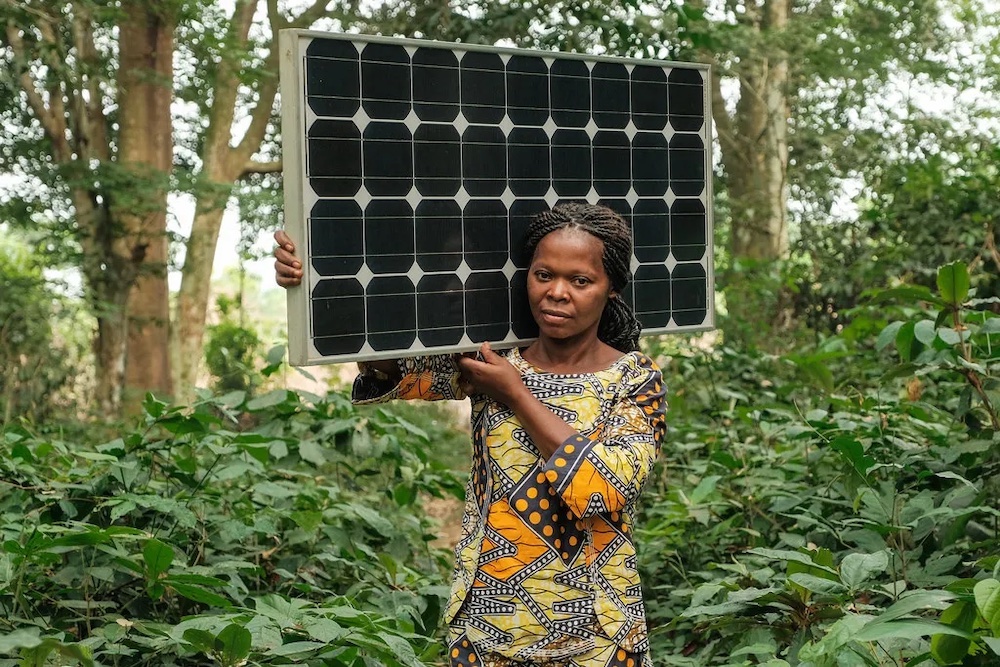Africa is poised to play a pivotal role in the global fight against climate change. Its untapped renewable energy potential, abundant land, natural resources, and a growing young workforce offer several promising pathways toward both climate adaptation and long-term mitigation through:
- Investment in widespread deployment of renewable energy infrastructure, namely solar panel manufacturing, wind turbine installation and grid optimization.
- Adopting climate-resilient agricultural practices, including agro-ecology, organic farming and sustainable agriculture.
- Creating water management strategies and resilient infrastructure to adapt to the changing patterns of precipitation and protect against extreme weather events.
To tap into these opportunities, Africa needs to prepare for the upcoming wave of green jobs.
Adaptation acceleration
A key agreement at last year’s COP28 climate summit in Dubai set the stage for a massive global green jobs wave. The Global Goal on Adaptation, or GGA, set forth a framework of targets to guide nations’ efforts to protect their people and ecosystems from climate change; it reflects global consensus on adaptation targets and the need for finance, technology, capacity-building support to achieve them.
Green skills, in both traditional sectors such as manufacturing and construction, as well as emerging ones like renewable energies, will be essential to the success of the GGA.
There is a current global shortage in green skills, however, including in Africa. An estimated 22.4% of the global workforce needs to have green skills in order to meet current demand, but only 12.3% have so far developed them. This represents a massive opportunity for job creation in the continent.
The lack of a comprehensive understanding of the green jobs market, coupled with low awareness among youth about these opportunities, poses a risk to workforce readiness. Limited collaboration between training institutions and the job market, as well as a lack of clarity on relevant training and qualifications, further compounds the issue.
As governments, donors and private sector investors work together to respond to needs and new climate adaptation commitments, it is crucial to address these challenges to ensure that African workers and youth can actively participate in and benefit from the green transition.
Localized upskilling
A shortcoming of the GGA is that it fails to consider diverse national circumstances, including those within the African context. Training for green skills on the continent will need to be dynamic and responsive to the specific needs of the sector: the shift towards a low-carbon, resource-efficient economy will not only require new products and services but also changes in production methods and business models.
To achieve this, green skills training should introduce innovative, in-school learning opportunities. This will allow students to acquire skill sets tailored to the unique challenges of each sector. It could also support teachers, through train-the-trainer approaches, creating a multiplier effect of expertise within the community.
Green skills training can also benefit from developing close ties to the private sector, ensuring a curriculum tailored to the specific needs of green jobs. This collaboration can enhance training relevance, thereby increasing employment prospects for youth looking to enter the green economy.
In Kenya, for example, the scarcity of green skills is impeding the adoption of solar-powered irrigation. Dalberg, in partnership with CLASP, is targeting this issue by developing a skilled workforce for solar irrigation. The pilot concept will bring together the private sector, development partners and training institutions to promote skills development and enable youth to access jobs in the sector. The pilot can be used to learn, adapt, and scale investment, contributing to climate adaptation and food security.
E-mobility is another growing green sector on the continent, owing to a significant increase in electric motorbikes, cars and buses on the road, paving the way for sustainable local employment in the sector. Skills development will be critical to meeting the potential of the growing EV industry and to enable proven business models to scale. Most existing education and training systems don’t equip workers for jobs in EV.
Organizations such as Africa New Energy Vehicles and Advanced Mobility are starting to address this challenge with a new e-mobility training program. This is just the start, but it marked a significant step in fostering expertise and promoting sustainable electric vehicle practices in Africa.
Funding green skills training
The untapped potential of the African continent, coupled with momentum generated at last year’s COP28 summit for global climate adaptation goals, sets the stage for a transformative journey towards sustainable development. Investments to facilitate the green transition of business will drive the strongest job-creation effect while having the lowest job displacement effect among major macro job trends through 2027.
New pools of climate funding should be directed toward initiatives that prioritize green skills development by pooling together expertise from funders, governments, the private sector, NGOs and academia, to mobilize existing resources more effectively.
An example is in Guinea-Bissau, where seawater intrusion is threatening agriculture livelihoods. A Green Climate Fund-funded project supported by a diverse consortium of local experts, private sector organizations, researchers, funders, and the government of Guinea-Bissau helped train over 450 youth in climate-resilient agriculture. Doing so strengthened the ability of local communities to adapt to changing environmental conditions and also promoted economic diversification and the empowerment of vulnerable populations.
The success of projects like these underscores the importance of collaboration between local expertise, private sectors and governmental support. Such efforts contribute to the development of a more resilient and skilled workforce, equipping the region to effectively tackle the challenges posed by climate change.
By supporting the development of green skills, Africa will not only meet its GGA targets but also create a sustainable and resilient future.
Charlie Habershon is an associate partner at Dalberg Advisors and the global co-lead of Dalberg’s Education to Employment practice. He is based in Nairobi.
Kusi Hornberger is a partner at Dalberg Advisors, based in the Washington, DC office.
Inês Charro is Dalberg’s practice area manager for Education to Employment. She is based in New York.











